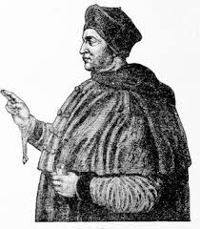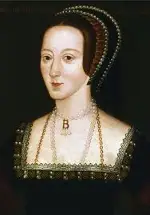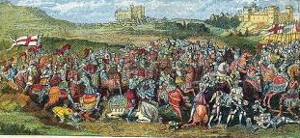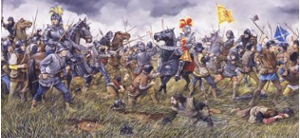King Henry VIII of England
Part 2: Battles Foreign and Domestic Also like some of his predecessors, Henry fought battles against both France and Scotland. English kings for many years had controlled much of France, the most successful being King Henry II, who left the Angevin Empire to his sons, who proceeded to lose it, in John's case in spectacular fashion. With distant dreams of some sort of reconquest, Henry VIII meddled in a European Continental alliance for a time and then invaded France, in June 1513. The English army, with Henry at its head, enjoyed success at the Battle of the Spurs. While king and army were in France, however, the Scottish king, James IV, invaded England. English forces defeated Scotland as well, at the Battle of Flodden Field in September 1513. (This was yet another instance of the Auld Alliance, a mutual defense agreement between France and Scotland.) Henry, still in France, had to come home, however, because he had run out of money to pay his troops. He settled for another alliance with the French king, Louis XII.

At the same time, working behind the scenes was Cardinal Thomas Wolsey, who had negotiated the 1518 Treaty of London, providing a framework for a European alliance against the Ottoman Empire, seen to be the aggressor at the time. The alliance lasted for a time; but in 1521, France and the Holy Roman Empire went to war. Henry initially supported Emperor Charles V but eventually decided that it was in England's best interest to take itself out of the fighting. 
This was in 1525. By this time, Henry was 34. He had a daughter, Mary, but no son. He became convinced that he and Catherine, who was now 40, would be unable to produce one, so he sought to divorce her and marry someone else. Henry was at this time still a devout Catholic. He considered himself a defender of the faith and had been granted that title by Pope Leo X after writing an official publication titled Defence of the Seven Sacraments in 1521; this work was essentially a refutation of the arguments put forward by Reformation leader Martin Luther. Nonetheless, Henry became more and more obsessed with having a son to become king after him. In 1527, he appealed to Pope Clement VII for an annulment of the marriage to Catherine. The pope refused, in part for political reasons (not the least of which was that Catherine's nephew was Charles V, the Holy Roman Emperor, who at the time had sacked Rome and forced the Pope into hiding) and in part because he did not want to contradict the ruling of one of his predecessors. In effect, Henry was asking the Pope for a dispensation in response to a dispensation. The first dispensation was, in effect, a tacit agreement that the Pope who had approved Catherine's original marriage, to Arthur, was in error. If Clement VII had granted a second dispensation, then he would have been admitting that Pope Julius II had clearly made a mistake in blessing the marriage of Henry and Catherine. Popes at this time were believed to be infallible–incapable of making a mistake. 
Pope Clement VII took his time in announcing his decision. Refusing to wait, Henry ordered Catherine banished from court and sent away to live somewhere else. King and queen had separate rooms in the royal residence, and one of Catherine's ladies-in-waiting, Anne Boleyn (right), moved into Catherine's rooms. Henry had decided that he wanted Anne, not Catherine, by his side. Meanwhile, Henry blamed Cardinal Thomas Wolsey for being unable to convince the Pope to annul the royal marriage. Wolsey, who at one time was a close confidant of Henry, ended up being charged with treason. He died awaiting trial and was replaced by Sir Thomas More, who was named Lord Chancellor and became the king's chief minister. Next page > Breaks and Heartbreaks > Page 1, 2, 3 |
|
Social Studies for Kids
copyright 2002–2026
David White






